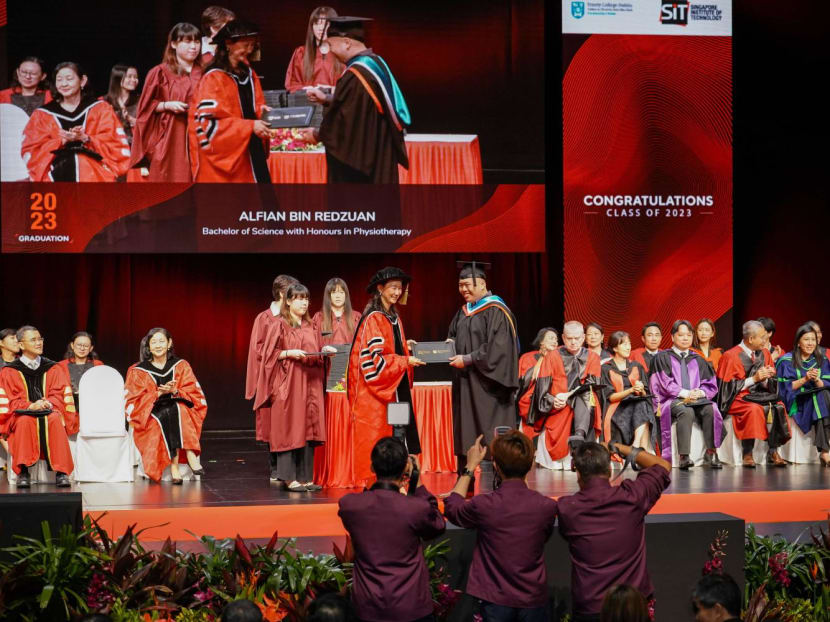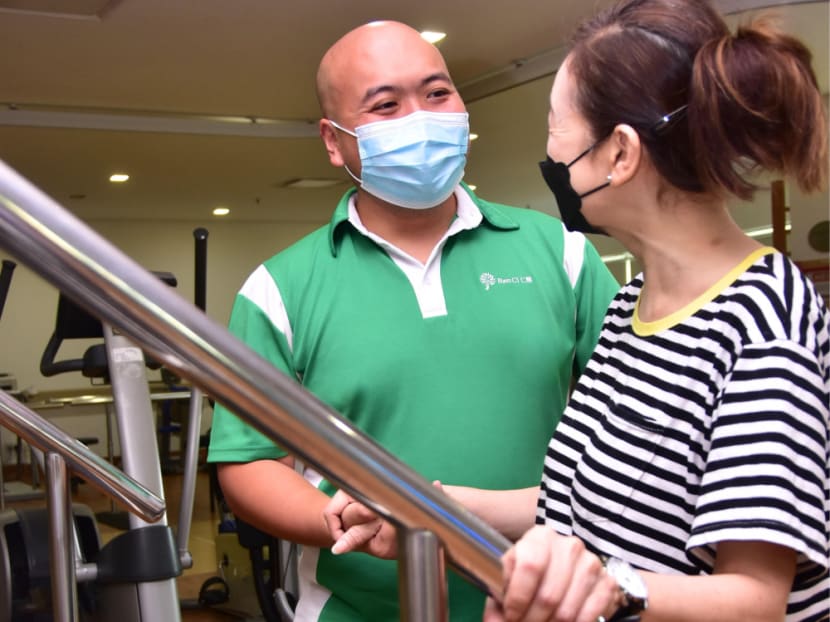Gen Y Speaks: An accident crushed my rugby dreams, but also led me to a rewarding career in physiotherapy
Throughout my journey of recovering from the accident, physiotherapists were the professionals who consistently helped me heal, enabling me to avoid surgery. Grateful and inspired by them, I held onto the hope that one day I could do the same for someone else.
As long as I can remember, I’ve always had a passion for sports. I was on the track-and-field team at my secondary school, competing in discus throw events, and later went on to play rugby throughout junior college and university.
I kept up with rugby until 2017, when a car accident compelled me to reconsider my involvement in the sport.
The accident left me with neck pain and spondylolisthesis leading to lower back pain and numbness in both my legs — injuries which made me fearful of continuing with sports and other strenuous activities. My orthopaedic specialist cautioned me to stop playing touch rugby, warning that I might need spinal fusion surgery in the near future (a major surgery to enhance spinal stability).
I was in emotional turmoil. I had hoped to keep playing rugby well into my 50s. But I now found myself torn between continuing what I loved and potentially needing a major, risky surgery.
As an only child, I worried about the possible impact on my career and my family. A single accident could affect my income, my future, and my ability to support my parents.
“Would I still be able to play with my nephews and nieces?” I wondered. “Would I even be able to carry them?”
Throughout my journey of recovering from the accident, physiotherapists were the professionals who consistently helped me heal, enabling me to avoid surgery.
When the Singapore Institute of Technology (SIT) launched its joint Physiotherapy degree programme with Trinity College Dublin in 2016, I did not hesitate to answer a calling that had been lingering in my mind since my youth. Grateful and inspired by the physiotherapists who aided me over the years, I held onto the hope that one day I could do the same for someone else.
However, about a decade ago, pursuing physiotherapy as a standalone degree programme in local universities was not an option. So, I pursued a degree in philosophy and gained work experience in the public sector and, most recently, at SIT's Student Life division.
A SIGNIFICANT TURN
My career took a significant turn when SIT introduced its four-year Physiotherapy degree programme and, later, Workforce Singapore’s Career Conversion Programme (CCP) for Allied Health Professionals. This prompted me to enrol in 2019, joining the second cohort of CCP students.
Transitioning back into student life at the age of 31 was no small feat. I had to immerse myself in complex theories about the human body and the deep knowledge that informs clinical recommendations for physiotherapists.
The teaching faculty, many of whom were practicing physiotherapists, imparted practical industry knowledge through patient anecdotes.
In adapting to the rigours of the degree programme, I faced personal challenges as an adult learner. For instance, my younger peers were more comfortable with online and digital interactions, while I preferred face-to-face and physical interactions, and our differing preferences posed something of a communication barrier.
I also encountered what I can only describe as a "body clock mismatch". Many of my peers could work late into the night, but I'm an early riser. This made it difficult for me to sync our study times and keep up with late-night group discussions and revision sessions. It was a challenge to balance my academic commitments with my natural energy rhythms.
HITTING THE RESET BUTTON
Outside of school, my friends were advancing in their careers and their family lives, and it often felt as though I was hitting the reset button and starting from scratch once more.
However, many of my loved ones were supportive of my decision — some even expressed envy at my courage in being willing to start afresh. Their encouragement went a long way towards motivating me to press on and was a source of comfort whenever I felt disheartened when facing challenges during my studies.
Comparing myself to my book-smart classmates in the programme also led to moments of self-doubt, but the camaraderie and support among our cohort alleviated those concerns.
The university's holistic training emphasised not only academic knowledge but also essential people skills and problem-solving abilities gained through work experience.
Besides written exams, our evaluations included oral reasoning, practical sessions with standardised patients, and five six-week clinical placements at healthcare institutions.
There's no substitute for the real-life lessons you gain from clinical placements. I’ve had the opportunity to attend attachments at different healthcare institutions, ranging from acute hospitals to organisations providing longer-term healthcare services within the community.
These experiences gave me a better perspective of the rehabilitation journey of patients, some of whom were grappling with recent life-changing events such as stroke and limb amputation. I also interacted with patients rebuilding their endurance while dealing with the prolonged sequalae of Covid-19 infection and hospitalisation.
Throughout, I had the opportunity to work closely with my clinical educators and buddies who were integral to my learning and personal development.

The key lesson I've learned is the importance of adaptability because no two patients are the same. Consider, for example, the different care required for a 40-year-old who has suffered a heart attack compared to a 75-year-old heart patient with additional conditions like failing kidneys and frailty.
Furthermore, patient attitudes and temperament can vary significantly; some are cooperative and mild, while others may be more emotional and impatient.
Despite the challenges, my ultimate goal remains unchanged: To positively impact patients with chronic conditions like hypertension and diabetes, as well as their family members. My hope is to improve their quality of life, even if it means enabling something as simple as a visit to a nearby coffee shop, and minimising their chances of hospital re-admission.
THE END? NOT QUITE
I’m now working as a physiotherapist at Ren Ci Community Hospital. Even though I’ve accomplished my career dream, I recognise that I still have much to learn.
I humbly acknowledge that I am far from being a ‘finished product’. Each day presents an opportunity for me to learn from my patients about their health and life experiences, shaping me into a better healthcare professional.
I have learnt to be adaptable and to seek support when I feel it is necessary. Each of us is on our own individual journey, and while some paths may seem longer than others, the things we encounter along the way all work to contribute to our unique life experiences.
Lastly, I’ve learnt that even in the face of great challenges, I can find ways to turn pain and strife to my benefit. Even when skies are dark and clouds are grey, there remains a silver lining to the struggles in life and a potential for growth. We just have to look for it.
ABOUT THE AUTHOR:
Alfian Bin Redzuan is a physiotherapist at Ren Ci Community Hospital.










